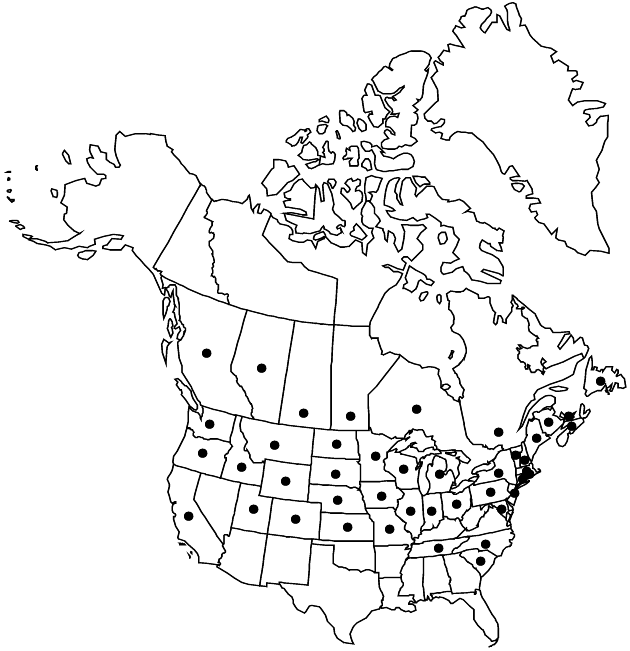Difference between revisions of "Artemisia absinthium"
Sp. Pl. 2: 848. 1753.
FNA>Volume Importer |
imported>Volume Importer |
||
| (5 intermediate revisions by 2 users not shown) | |||
| Line 8: | Line 8: | ||
}} | }} | ||
|common_names=Common wormwood;armoise absinthe | |common_names=Common wormwood;armoise absinthe | ||
| + | |special_status={{Treatment/ID/Special_status | ||
| + | |code=I | ||
| + | |label=Introduced | ||
| + | }} | ||
|basionyms= | |basionyms= | ||
|synonyms= | |synonyms= | ||
| Line 24: | Line 28: | ||
|elevation=0–1000 m | |elevation=0–1000 m | ||
|distribution=Alta.;B.C.;Man.;N.B.;Nfld. and Labr. (Nfld.);N.S.;Ont.;P.E.I.;Que.;Sask.;Calif.;Colo.;Conn.;Idaho;Ill.;Ind.;Iowa;Kans.;Maine;Md.;Mass.;Mich.;Minn.;Mo.;Mont.;Nebr.;N.H.;N.J.;N.Y.;N.C.;N.Dak.;Ohio;Oreg.;Pa.;R.I.;S.C.;S.Dak.;Tenn.;Utah;Vt.;Wash.;Wis.;Wyo.;Europe. | |distribution=Alta.;B.C.;Man.;N.B.;Nfld. and Labr. (Nfld.);N.S.;Ont.;P.E.I.;Que.;Sask.;Calif.;Colo.;Conn.;Idaho;Ill.;Ind.;Iowa;Kans.;Maine;Md.;Mass.;Mich.;Minn.;Mo.;Mont.;Nebr.;N.H.;N.J.;N.Y.;N.C.;N.Dak.;Ohio;Oreg.;Pa.;R.I.;S.C.;S.Dak.;Tenn.;Utah;Vt.;Wash.;Wis.;Wyo.;Europe. | ||
| + | |introduced=true | ||
|discussion=<p><i>Artemisia absinthium</i> provides the flavoring as well as the psychoactive ingredient for absinthe liquor, a beverage that is illegal in some markets. Known as a powerful neurotoxin, absinthe in large quantities is addictive as well as deadly. The species is popular in the horticultural trade. Prized by gardeners for its gracefully scalloped leaves and gray-green foliage, it creates an attractive and winter-hardy flower border.</p> | |discussion=<p><i>Artemisia absinthium</i> provides the flavoring as well as the psychoactive ingredient for absinthe liquor, a beverage that is illegal in some markets. Known as a powerful neurotoxin, absinthe in large quantities is addictive as well as deadly. The species is popular in the horticultural trade. Prized by gardeners for its gracefully scalloped leaves and gray-green foliage, it creates an attractive and winter-hardy flower border.</p> | ||
|tables= | |tables= | ||
| Line 33: | Line 38: | ||
-->{{#Taxon: | -->{{#Taxon: | ||
name=Artemisia absinthium | name=Artemisia absinthium | ||
| − | |||
|authority=Linnaeus | |authority=Linnaeus | ||
|rank=species | |rank=species | ||
| Line 48: | Line 52: | ||
|publication title=Sp. Pl. | |publication title=Sp. Pl. | ||
|publication year=1753 | |publication year=1753 | ||
| − | |special status= | + | |special status=Introduced |
| − | |source xml=https:// | + | |source xml=https://bitbucket.org/aafc-mbb/fna-data-curation/src/2e0870ddd59836b60bcf96646a41e87ea5a5943a/coarse_grained_fna_xml/V19-20-21/V19_885.xml |
|tribe=Asteraceae tribe Anthemideae | |tribe=Asteraceae tribe Anthemideae | ||
|genus=Artemisia | |genus=Artemisia | ||
Latest revision as of 19:57, 5 November 2020
Perennials, 40–60(–100) cm (mat-forming), aromatic. Stems gray-green (sometimes woody proximally), densely canescent to glabrescent (hairs appressed). Leaves deciduous, gray-green; blades broadly ovate, 3–8 × 1–4 cm, mostly pinnately lobed (basal 2–3-pinnatifid, lobes obovate), faces densely canescent. Heads (nodding) in open (diffusely branched), paniculiform arrays 10–20(–35) × (2–)10–13(–15) cm. Involucres broadly ovoid, 2–3 × 3–5 mm. Phyllaries gray-green, densely sericeous. Florets: pistillate 9–20; bisexual 30–50; corollas 1–2 mm, glandular. Cypselae (± cylindric, slightly curved, obscurely nerved), ± 0.5 mm, glabrous (shiny). 2n = 18.
Phenology: Flowering mid summer–fall.
Habitat: Widely cultivated, persisting from plantings, disturbed areas
Elevation: 0–1000 m
Distribution

Introduced; Alta., B.C., Man., N.B., Nfld. and Labr. (Nfld.), N.S., Ont., P.E.I., Que., Sask., Calif., Colo., Conn., Idaho, Ill., Ind., Iowa, Kans., Maine, Md., Mass., Mich., Minn., Mo., Mont., Nebr., N.H., N.J., N.Y., N.C., N.Dak., Ohio, Oreg., Pa., R.I., S.C., S.Dak., Tenn., Utah, Vt., Wash., Wis., Wyo., Europe.
Discussion
Artemisia absinthium provides the flavoring as well as the psychoactive ingredient for absinthe liquor, a beverage that is illegal in some markets. Known as a powerful neurotoxin, absinthe in large quantities is addictive as well as deadly. The species is popular in the horticultural trade. Prized by gardeners for its gracefully scalloped leaves and gray-green foliage, it creates an attractive and winter-hardy flower border.
Selected References
None.